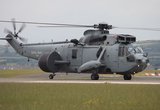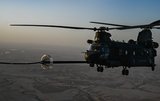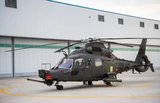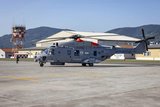Software change gives V-22 pilots more lift options
A test team from the V-22 Joint Program Office spent about six weeks in Logan, Utah confirming that a small software change will result in more lift capability for the Osprey.
The actual change, which is barely observable to the eye, calls for the V-22 rotors to be tilted about four degrees outward. This change reduces the air flow from the rotors over the wings, which allows the V-22 to carry more weight and achieve greater overall performance in hover mode.
“We did see the performance gain from the software change that we expected,” said Trevor Strand, V-22 flight test engineer. “It gives the pilot more options. He can either carry more fuel, more troops, go to higher altitudes, or some combination of the three.”
Strand led the 30-person integrated test team (ITT) during the off-site test at the Logan-Cache Airport during July and August.
The ITT flew 25 test flights in 31 days. This effort was the result of about two years of work by NAVAIR engineers to improve the hover performance of the V-22.
The software change that was measured and confirmed in Logan has already been implemented into some MV-22s. The plan is to upgrade all V-22s by the end of the year. The test team is currently updating performance documentation for V-22 operators.
The V-22 team averages about one off-site test event a year. Considerable research and planning goes into finding just the right spot.
“We don’t like to do all of our hover performance testing at sea level because the proprotor is not working at its maximum limits,” Strand said. “We don’t want to max out the engines at a very high altitude like 9,000 feet either so the ideal location is somewhere in between.”
At about 4,400 feet in elevation, Logan provided an ideal test location including the required wind conditions.
“It was one of the most successful off-sites that we’ve ever had,” Strand said.
The test team took one MV-22 Osprey to Logan for the test and it was available 100 percent of the time.
“The entire team did an outstanding job,” said Mike Caram, V-22 test manager. “It was a very productive off-site with a lot of great work on everyone's part.”
Source: Naval Air Systems Command (NAVAIR)
More from Defence Helicopter
-
![Germany to send WS-61 Westland Sea King helicopters to Ukraine]()
Germany to send WS-61 Westland Sea King helicopters to Ukraine
Germany has committed to sending Ukraine six of its 21 retiring WS-61 Westland Sea King multirole, amphibious helicopters.
-
![Boeing secures $271 million to advance modernisation of US Special Operations' MH-47G Chinook]()
Boeing secures $271 million to advance modernisation of US Special Operations' MH-47G Chinook
Boeing has clinched a major contract modification to further its backing of the US Special Operations Command’s MH-47G Chinook aircraft modernisation effort.
-
![Dubai Airshow 2023: South Korean homegrown helicopters make international debut]()
Dubai Airshow 2023: South Korean homegrown helicopters make international debut
Two KAI helicopters, the KUH-1E utility helicopter and the Light Attack Helicopter (LAH), have taken centre stage at the Dubai Airshow 2023.
-
![Italian Navy receives final NH90 helicopter]()
Italian Navy receives final NH90 helicopter
The Italian Navy now boasts a fleet of 56 NH90 helicopters comprising 46 SH-90As and 10 MH-90As.
-
![Argentina seeks AW109 and CH-46 Sea Knight helicopters]()
Argentina seeks AW109 and CH-46 Sea Knight helicopters
The Argentinian Air Force (FAA) and the Argentinian Naval Aviation Command (COAN) are looking for options to upgrade their helicopter fleets.
-
![DSEI 2023: Lockheed to produce about 40% of Black Hawks on UK soil if it wins NMH contest]()
DSEI 2023: Lockheed to produce about 40% of Black Hawks on UK soil if it wins NMH contest
Lockheed Martin promises a boost to the British job market and export opportunities, while strengthening ties with Poland and positioning the UK for a future in rotorcraft technology in the event of a New Medium Helicopter competition triumph.


























